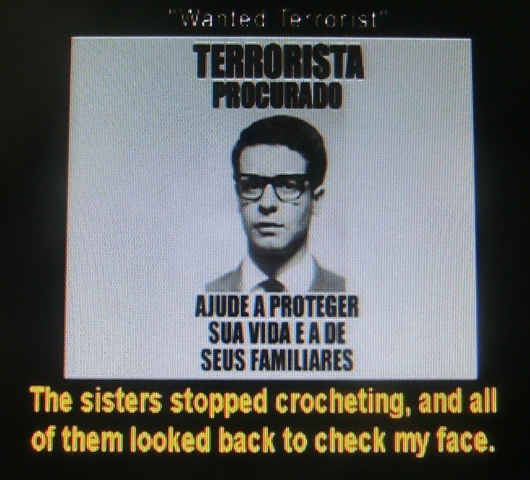Klaus Hart Brasilientexte
Aktuelle Berichte aus Brasilien – Politik, Kultur und Naturschutz
„Maranhao Tragedy“. Brasiliens wichtigster Befreiungstheologe Frei Betto.
Due to negligence on the part of the government of Roseanna Sarney in the state of Maranhão[1], Brazil and the whole world are witnessing a tragedy there. In the Pedrinhas jail in Sao Luis, 62 prisoners were murdered during recent months, most of whom were decapitated. The images are on the internet.
The UN High Commission for Human Rights has asked the Brazilian government to investigate the Pedrinhas slaughter. It’s worth remembering that in November 2013 the Justice Minister, Jose Eduardo Cardozo, declared that in Brazil “dying is preferable to being jailed”.

Fahndungsfoto der nazistisch-antisemitisch orientierten Militärdiktatur zu Dominikaner Frei Betto, selbst in der damaligen brasilianischen TV-Tagesschau ausgestrahlt. Heute ist Frei Betto Brasiliens wichtigster katholischer Befreiungstheologe.
Die “Terroristen” der katholischen Kirche Brasiliens: http://www.hart-brasilientexte.de/2014/01/17/brasilien-2014-50-jahre-nach-dem-militarputsch-von-1964-die-terroristen-der-katholischen-kirche-welche-bonner-politiker-damals-gegen-das-foltern-und-totfoltern-von-regimegegnern-nicht-protesti/
There are 515,000 prisoners in our country at present. Many have not been sentenced. Most of those in jail live promiscuously crowded together and the security system is unable to stop the practise of crimes from both within and without the prison.
How to explain mobile phones in prisons? They are detected by electronic controls in every airport. Now, we know that prison guards are not well paid or are not sufficiently prepared for the job, which makes many of them vulnerable to corruption. Thus, prisons become Swiss cheeses, full of holes through which mobiles, drugs and arms can enter.
There are prison directors and employees who resist mobile phone blockers because they hinder their outside mobile phone contact. Crime is grateful for corporativism…
Prisoners direct crimes from within their cells, such as extortion by phone where victims fall for a tale about a family member being in the hands of thugs. From cells in the Pedrinhas prison, criminal factions ordered a bus to be set on fire which ended with the death of a little girl.
Brazil clamours for reform of the prison system where new methods can re-socialise detainees. I insisted on this matter, in vain, with the Ministry of Justice, during my two years as advisor to President Lula.
I spent two of my four prison years (1969-1973) as a common prisoner. In the Penitentiaries of Carandiru and Presidente Venceslau, in Sao Paulo, I was able to verify, in practice, how it isn’t difficult to recuperate common prisoners. All they need is an occupation. Not merely as cleaners, kitchen help or pulling out weeds.
We were six political prisoners amid 400 common prisoners, promoting bible and theatre groups, art classes and a supplementary high school course. Over 100 detainees benefited from this initiative and many became re-socialised.
Every prison could be transformed, in partnership with private enterprise, into schools for teaching computer training, cooking, languages, as well as for qualifying plumbers, electricians, master builders etc.
The heart of the matter is that the government is not really interested in re-socialising common prisoners. If anyone is interested in the reasons for this absurd omission, they can read Michel Foucault.
[1] Maranhão is a state in the poorer North East of Brazil, Sao Luis being the state capital. Roseanna Sarney is the governor.
*Frei Betto is a writer, advisor to social movements and author of “Diário de Fernando – nos cárceres da ditadura militar brasileira” (Rocco) (Fernando’s Diary – in the jails of the Brazilian military dictatorship).
www.freibetto.org twitter: @freibetto.
ABOUT FREI BETTO
He is a Brazilian Dominican with an international reputation as a liberation theologian.
Within Brazil he is equally famous as a writer, with over 56 books to his name. In 1985 he won Brazil’s most important literary prize, the Jabuti, and was elected Intellectual of the Year by the members of the Brazilian Writers’ Union.
Frei Betto has always been active in Brazilian social movements, and has been an adviser to the Church’s ministry to workers in São Paulo’s industrial belt, to the Church base communities, and to the Landless Rural Workers’ Movement (MST).
« Fußball-WM 2014 in Brasilien: Die offizielle deutsche Website zum strategischen Partnerland der Berliner Regierung. – Brasilien 2014 – 50 Jahre nach dem Militärputsch von 1964: Die „Terroristen“ der katholischen Kirche. Welche Bonner Politiker damals gegen das Foltern und Totfoltern von brasilianischen Regimegegnern nicht protestierten. „Terrorista procurado“ – Brasiliens wichtigster katholischer Befreiungstheologe Frei Betto. Helmut Schmidt(SPD) und die Folterdiktatur. »
Keine Kommentare
Noch keine Kommentare
Die Kommentarfunktion ist zur Zeit leider deaktiviert.
NEU: Fotoserie Gesichter Brasiliens
Links zum Thema Ukraine
Fotostrecken Wasserfälle Iguacu und Karneval 2008
interessante Links
Seiten
Ressorts
- Kultur (6.975)
- Naturschutz (1.101)
- Politik (12.729)
Suchen
RSS-Feeds
Verwaltung


